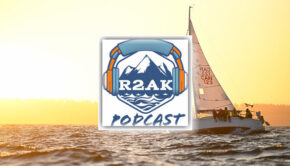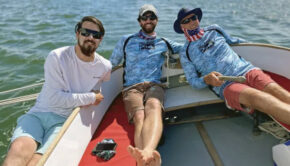R2AK: Bringing Adventure Back to the Sport
Published on May 21st, 2015
by Kurt Hoehne, Northwest Yachting
In today’s world, there are few adventures with Big Questions. It seems every adventure has been done at least once before. Somebody’s going to find a new route to the summit, win the game on a superlative performance or lucky bounce, or find that extra bit of speed around the race. Those are relatively Little Questions.
Maybe that’s the appeal of the inaugural Race to Alaska (R2AK), 750 miles from Port Townsend, WA to Ketchikan. It asks Big Questions. There aren’t a whole lot of rules other than make your way to Ketchikan via boat. The boat can’t have an engine and has to pass through only three checkpoints along the way. Use whatever boat you want and go the route you want.
There’s no big safety equipment checklist (there is a little one, however). There are no scantlings to adhere to, no nanny boats to accompany the fleet. The race organizers are leaving it to the competitors to manage the dangers themselves.
“It’s like the Iditarod, on a boat, with a chance of drowning…being run down by a freighter, or eaten by a grizzly bear.” – from the R2AK web site and promotional material.
To understand the race, you have to know a little bit about the race founder, Jake Beattie. He’s a Northwesterner through and through. He spent 3 years on tall ships, three years with Outward Bound, worked in commercial shipping sector and at the Center for Wooden Boats. He is now the Executive Director at the Northwest Maritime Center in Port Townsend. To say he’s passionate about getting people on the water is a profound understatement.
It doesn’t take much to get him to say what he really feels about boating. “Boating is in trouble,” he says. “Every year a new gadget comes out and every year it gets more expensive. At the same time disposable income and the middle class are decreasing.”
Praise Neptune! We’re with you Jake, go on!
“We need to think in different ways about what’s acceptable, which suggests a lower price. We need big adventures in smaller, more affordable boats.”
Beattie himself has a target max of $600 when he buys a boat, and sticks to it. It doesn’t buy him much, but he’d be quick to tell you he’s had as much or more fun on his $600s as most people have on their $600Ks. Beattie himself is going to do the R2AK on a square-sterned Grumman canoe, modified with amas to make it a trimaran. “I’m not going to win,” he says flatly. He won’t, and won’t care.
Jake and some like-minded simpler-is-better folks, properly lubricated in the Wooden Boat Festival beer tent in 2013, started batting around the idea of a non-motorized boat race to Alaska. Make it interesting, put a real sum out there for the winners. The image of nailing $10,000 to a tree stuck. Six months later the same group found themselves at dinner and the topic took over conversation again.
How long would it take? What boat would work? Who would do it? Would anybody die because they weren’t prepared? Big Questions.
Beattie was undaunted and put it to the Northwest Maritime Center board to see if his employer would sponsor the race. Somewhat to his surprise, the board said Yes, the insurance company said yes (lower case, I’m sure) and the announcement was put out last August. – Read on
Editor’s note: Only the winner gets $10k…the runner-up gets a set of steak knives. The course will cross killer whales, tidal currents, and cold water temperatures. The race starts June 4, has attracted 40 entrants, and is estimated to take a couple weeks to finish.







 We’ll keep your information safe.
We’ll keep your information safe.